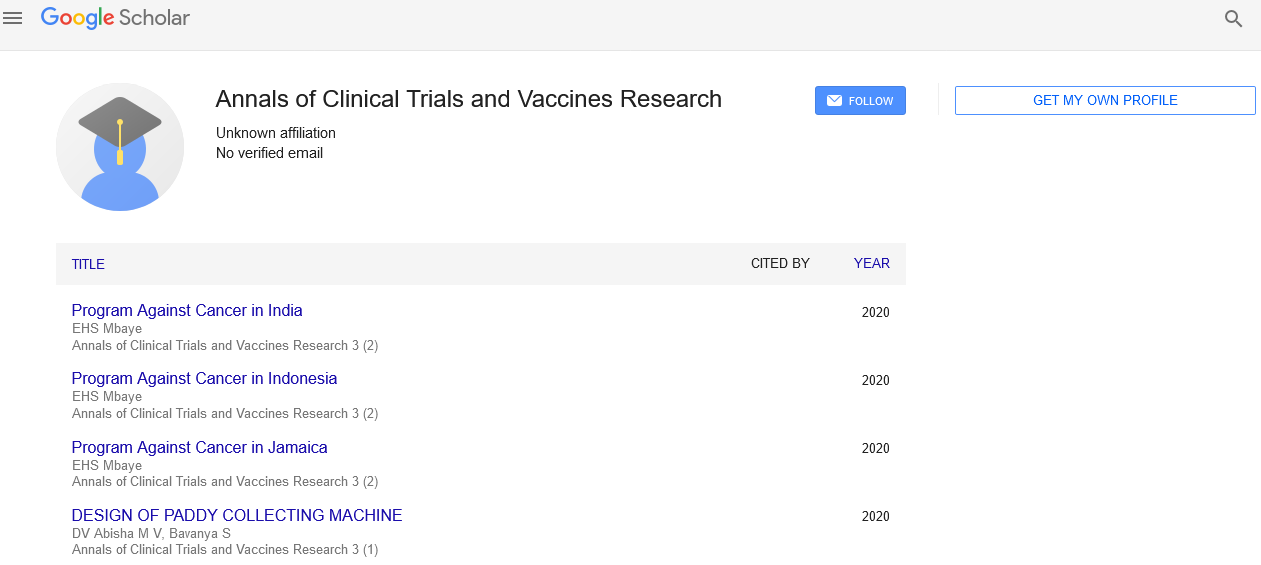Short Article - Annals of Clinical Trials and Vaccines Research (2020) Volume 3, Issue 3
Unlocking the Potential of Personal Cancer Vaccines: The Clinical Ramifications of Antigen Competition Driven Immunoediting
Michael G Hanna Jr
Director, Chairman Emeritus Vaccinogen Inc, USA
Abstract
Advances in the molecular characterization of tumors have led to a better understanding of the molecular pathways that underlie cancer. While the realization of intratumor heterogeneity has posed major limits to potential targeting of the mutated pathways and created limits to the central concept of personalized (targeted) medicine. The essential question is whether the approach to targeted medicine will result in any therapeutic strategy that will provide cure or long-term remission in the presence of genomic heterogeneity. The immune system has become a leading protagonist in successfully treating adenocarcinomas. However, with all of the accomplishments of the past two decades in the molecular characterization of tumors, the goal unfortunately was to obtain sustainable adaptive immune responses with agnostic cancer vaccines in advanced disease patients. This approach failed. For good reasons, the recent focus has been on achieving durable passive anticancer immunotherapy (check point inhibitors, tumor Infiltrating lymphocytes) in advanced disease patients with disseminated disease. In either case, cancer immunotherapy has proven to be a major challenge because it is an attempt to overcome those processes that evolved to mediate immune tolerance to self-antigens.
Advances in genomic sequencing and bioinformatics over the past decade have presented a clearer understanding at the molecular level, of the challenges for the immune response to cancer. In fact, during this decade of enlightenment, the development of better sequencing and laboratory tools have expanded our knowledge and capabilities of the neoantigens derived from somatic mutations produced in the repertoire of the tumor cells. In 2008, it was reported that there were between 75 and 125 coding mutations per tumor in lung, breast and colorectal adenocarcinomas. Only seven years later, with advanced sequencing technology and equipment, millions of mutations were discovered in a 3.5-cm squared segment of hepatocarcinoma. The summarized results were, they estimated millions of coding region mutations in this tumor and they estimated drug resistance to be 1 in 5000 tumor cells of any individual clone. Assuming that this is 12 to 13 cell divisions with the established somatic cell doubling time of 6 hours, that could be a loss of potential immune targets every 3 to 4 days. This off-target condition is a limitation of all forms of systemic drug, passive antibody as well as active immunotherapy and does not bode well for the “targeted therapy” movement. It is no longer logical to treat a heterogeneous disease with a homogeneous treatment. If we intend to leverage the power of the immune system for cancer treatment, we must adopt a viewpoint that includes the host-tumor interactions. A popular approach involves identifying key genetic lesions from one or a small number of biopsies evident and extrapolating outward assuming many of these unique markers are translated from the genetic sequence to the protein level to a meaningful degree and distributed or present in other tumors of the same histological type with a degree of homogeneity. We can refer to this as the “inside out” approach. This approach is currently being used to develop algorithms for epitope vaccines. This translation must happen in a manner compatible with active immune recognition.
We have presented the conceptual and practical justification for Active (Patient specific) Immunotherapy (ASI) vaccination in preventing progression of post resection, minimal residual disease, both in a unique syngeneic guinea pig model and in a successful Phase III clinical trials in colon cancer. The basis of this personal treatment success is the interaction of two known immune functions, antigen competition and immune editing. The result of these host tumor interactions is a sculpting of the tumor from a diverse array of immunogenic tumor cell clones, ranging from weak to strong antigens, to a restricted set of weakly immunogenic clones. These clones can survive and kill an immunocompetent host due to immune tolerance. The personal immunization is administered intradermally with a critical number of live, irradiated (nontumorigenic) cells. The autologous tumor cells are admixed with TICE BCG, an adjuvant capable of eliciting a strong innate immune response and recruiting and trafficking large numbers of immunocompetent progenitor cells to the vaccination sites. This reaction cannot be achieved with tumor cells alone and the resultant tumor specific immunity cannot be achieved with BCG alone. This compounded vaccination breaks immune tolerance and provides a robust immune reaction that consists of cytotoxic T cells(also known as TC, cytotoxic T lymphocyte, CTL, T-killer cell, cytolytic T cell, CD8+ T-cell or killer T cell is a T lymphocyte a type of white blood cell that kills cancer cells, cells that are infected particularly with viruses, or cells that are damaged in other ways) and strong immunologic memory. The clinical benefit, particularly in the unmet medical need of stage II (T3 &T4 a & b) colon cancer is a highly significant recurrence free-survival benefit, with an actual durability of 15 years. Also, the tumor specific immune response in these patients provided biological resources (tumor specific Human Monoclonal Antibodies) the targets of which, have been partially characterized and immunologically tested for identifying mutant neoantigens and thus neoepitopes(a class of Major Histocompatibility Complex (MHC) bounded peptides that arise from tumor-specific mutations. They represent the antigenic determinants of neoantigens. Neoepitopes are recognized by the immune system as targets for T cells and can elicit immune response to cancer). These will foster research and development of natural therapeutic and prophylactic adenocarcinoma vaccines. These important correlates of the host tumor interactions that lead to the prevention of progress of minimal residual disease support the potential of combinatorial treatments of personal ASI to achieve important clinical benefits of standard treatments of advanced disease patients is the authentic and exact new beginning of immunotherapy.

